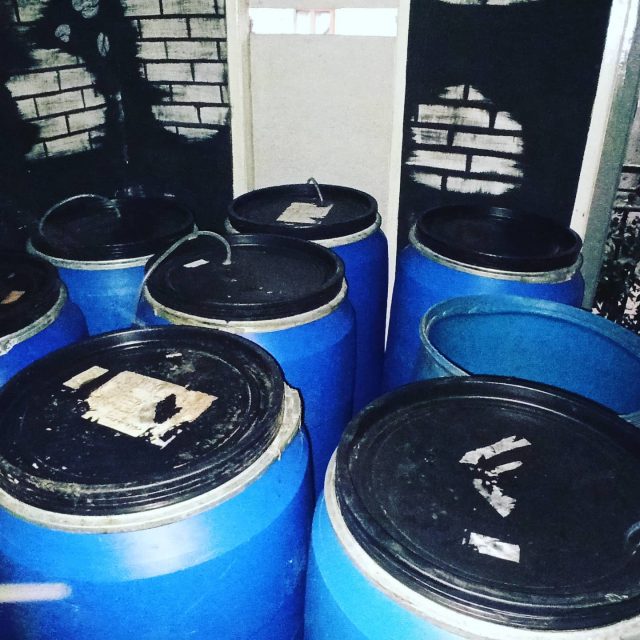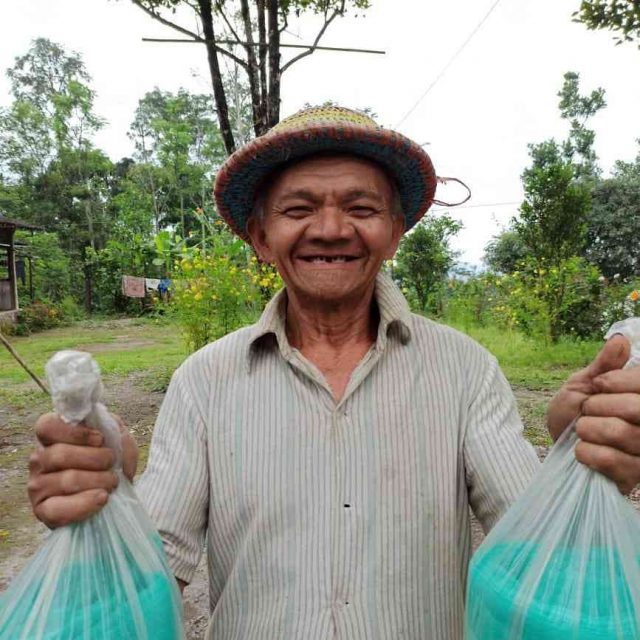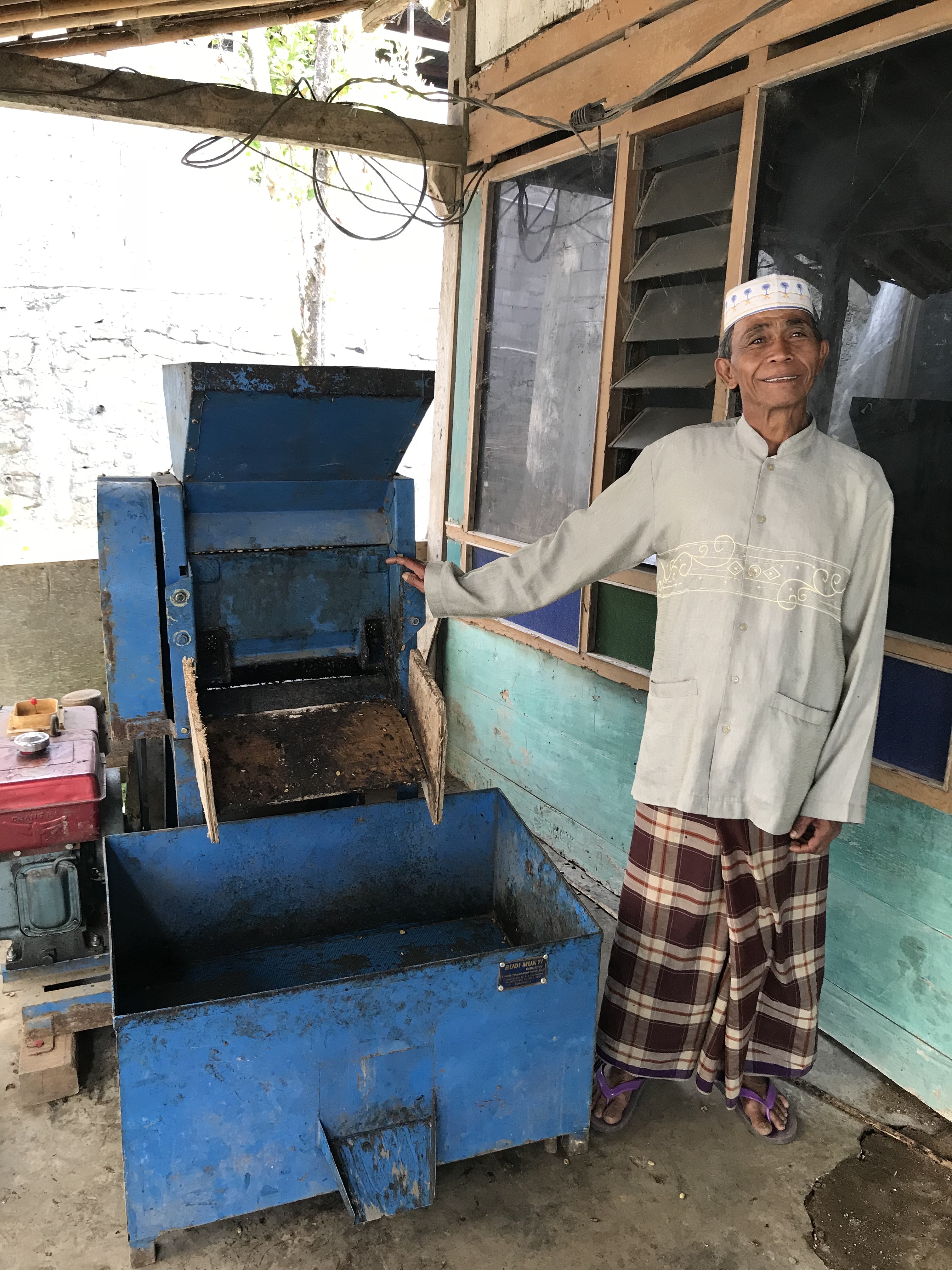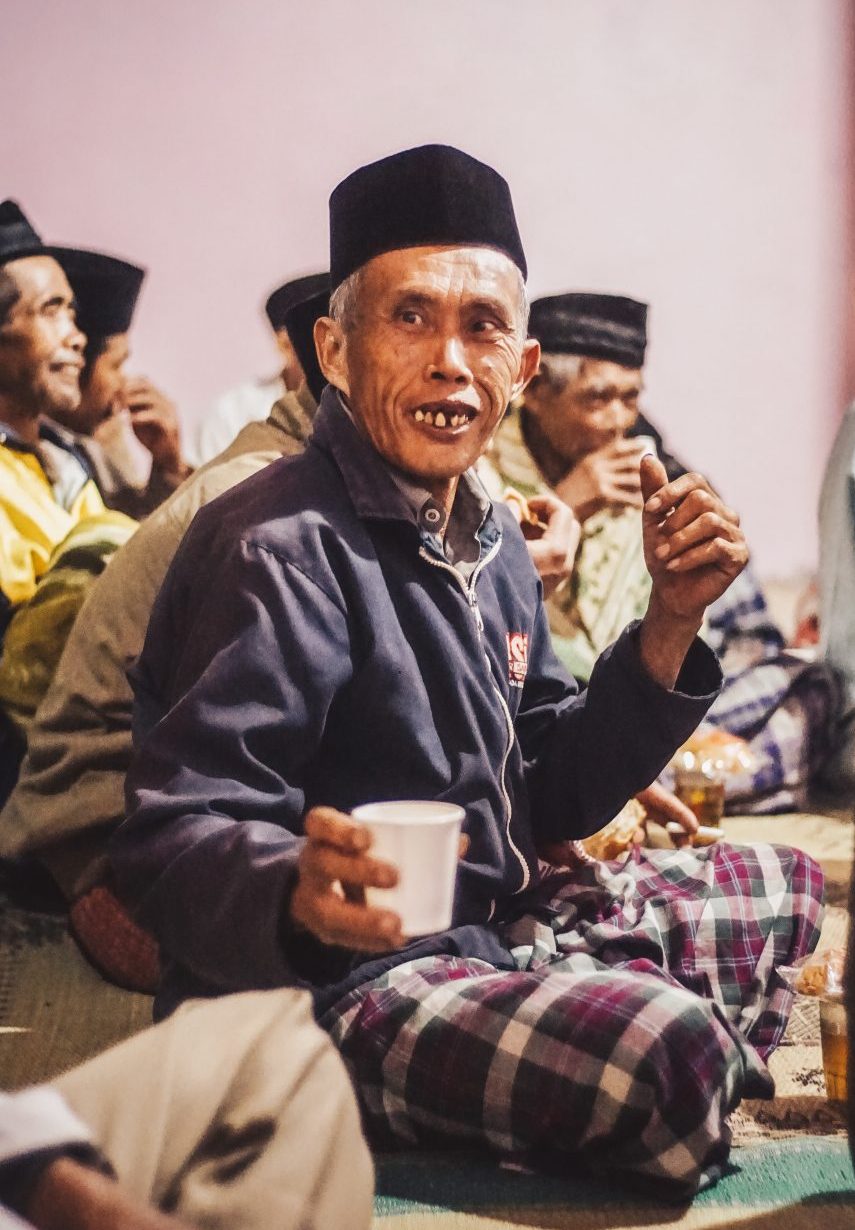Our Merbabu coffee is grown in several small villages, on the slopes of Mt Merbabu in Central Java. Tosoro is the first village that Bright Java begun working with directly, back in 2017. We stumbled on them as we were perfecting our method for finding new origins: randomly drive around on the mountains and start chatting with people. This doesn’t lead us to industrial scale producers who already do exporting. This is the beginning of an ongoing relationship with small producers that leads to community transformation and, incidentally, amazing microlots of unique specialty coffee.

This village, it turned out, had received Arabica seedlings from a government program 20 and 30 years before. The trees had been producing, but the government had never come back with further instructions. So the villagers had proceeded with their usual coffee handling methods, developed on the Robusta harvested more commonly here: clean-stripping the branches at harvest, using a basic method of wet hulling via tarps on the ground, and selling the parchment at the local markets for the rock-bottom price. Some of them even cut down the trees and switched to selling vegetables.
Upon meeting us, they were intrigued by the possibility of getting a better price for their coffee. They already had a farmer’s co-op for all their produce, and the leader of that co-op became the linchpin for gathering the community around a common effort to improve their coffee processing. In that first year, 13 growers were interested in working with us. We spent months teaching farmers how to create specialty Arabica, from the picking to the processing.

We paid higher than the local market rate the farmers would have received for commodity coffee. Talk about microlots! We logged Mr. Mahmudi’s 18 kilos along with Mrs. Ngatini’s 11 kilos so we could track the quality and moisture levels of each, and give them quality feedback individually. With such small quantities, we initially only sold their coffee roasted locally. As a sort of seed offering, we set aside all the profits of those first year’s sales to be used to invest in upgrading their setup in following years.
They had tasted their own coffee, but only dark-roasted and sugared in the traditional Robusta way. We had memorable times of roasting their coffee and bringing it back for them to drink as it should be enjoyed for the first time.


This year’s harvest
Fast forward to 2020 and this village is reaping the fruits of their labor as production accelerates.
Suddenly this year we heard about a village called “Lower Tosoro” which wanted to be part of the action. (We were in Upper Tosoro all the time? Who knew?) Now 50 farmers are part of the co-op – both men and women, about 85% of the homes in this village. They still each do their own picking and hand-processing, so it is no small feat of cooperation that they are able to create an origin with a consistent quality!
For the future, we’re encouraging them to nurture health of their trees. Technically coffee in Tosoro Village is 100% organic (although not certified) – the trees have been neglected and in fact, the farmers do not use any inputs on them. We are currently emphasizing to them steps like pruning, composting, and using natural methods of pest control to achieve optimal harvests.

Writing a New Story on Mt. Merbabu
Central Java is not an internationally known coffee origin right...
Read MoreRecent Instagram Posts On Merbabu Coffee
Our Agents Of Change at Merbabu in Central Java watching the documentary about becoming Agents Of Change with @mikaeljasin. There's probability a New Age word that describes this but I don't know it.
#caturcoffeecompany #sosogoodcoffeecompany #merbabu #kopijateng #coffeeispeople ...
Coming Soon to America: Central Java Mount Merbabu Natural Process.
#Merbabu #centraljavacoffee #kopijateng #indonesiaspecialtycoffee #indonesia #coffeeprocessing ...
"Hello everyone, I am Pak Jaimin. We here on Mount Merbabu have been working hard with Bright Java to bring you great beans. Please by my coffee."
#Merbabu #kopijateng #coffeeprocessing #coffeeispeople #farmerdirect #specialitycoffee ...
Really pleased with the sortation results from our sized Grader and gravity separator. While still needing a final hand sort on this, our #Merbabu natural process it will be a much shorter process and we should have the first 500kg of the 2020 harvest ready by the end of the week. Order up!
#kopiMerbabu #kopiindonesia #coffeeprocessing #specialitycoffee #coffeeexporters #drymill ...
Let's make some naturals.
#kopiindonesia #specialtycoffee #indonesiaspecialtycoffee #merbabu ...
If you could only smell the goodness in these dried coffee cherries.
#naturalprocess #Merbabu #kopiindonesia #centraljavacoffee #coffeehunter #coffeeispeople ...
We want to give special recognition to our farmer relation manager, @handoko100 for working with the population of Tosoro Merbabu to build these raised drying beds. Through his hard work this harvest season we have a chance to bring great coffee and economic transformation to an entire community.
#arabicacoffee #specialtycoffee #Merbabu #coffeeispeople #kopiMerbabu #kopijateng #centraljavacoffee ...
Cherry selection is one of the most important factors in green coffee quality. Too ripe and you end up with rotted fruit flavors in your coffee. Too green abs you will have bitter, astringent notes. Here one of our #Merbabu farmers shows off fresh picked cherries as good as it gets from that origin.
#kopiindonesia #specialtycoffee #indonesiaspecialtycoffee #arabicaMerbabu #coffeehunter #coffeeispeople ...
Some of our best coffee has come from our nearby Mt. Merbabu.
Beberapa kopi terbaik kami datang dari Gunung Merbabu.
#indonesia #coffee #specialtycoffee #coffeehunter #Merbabu ...
@handoko100 has been hard at work making drying racks while preparing for the 2020 harvest on #Merbabu. We have partnered with a village to make more of a great natural processed coffee that was a hit for 2019.
#specialtycoffee #coffeeispeople #kopijateng #java #javacoffee #arabica # coffeeexports #kopiindonesia #indonesia ...
The harvest is still coming! We recently purchased netting for our farmers in #Merbabu who make an awesome natural processed coffee. With this netting we will have them build raised parapets for more efficient drying. DM to find out how to get on the list to receive some of our Natural Process Merabu when then harvest is complete.
#farmerdirect
#JawaTengah
#kopijawa
#CentralJavaCoffee
#Java
#coffeeispeople ...

















You must be logged in to post a comment.